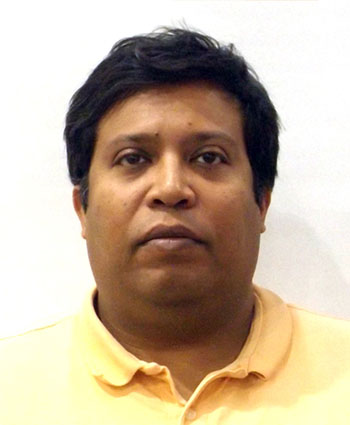
Ambarish Nag
Researcher IV-Data Science
Ambarish.Nag@nrel.gov
303-275-3754
 https://orcid.org/0000-0001-5174-4673
https://orcid.org/0000-0001-5174-4673
Ambarish Nag is a senior data scientist in the Computational Science Center. He joined NREL as a postdoctoral researcher in 2009. His current interests involve the application of data science and machine learning to multiple aspects of renewable energy research with emphasis on bioenergy, transportation, photovoltaics (PV), and the electric grid. His recent transportation research projects include data analytics for the development of a digital twin of the Chattanooga, Tennessee, traffic system as part of the U.S. Department of Energy (DOE) Vehicle Technologies Office-funded Regional Mobility project and the creation of an R-Shiny prototype application for customization and visualization of the MEP (Mobility-Energy-Productivity) metric as part of a collaboration between NREL and the Ford Motor Company.
Ambarish worked with the team that developed the RdTools open-source library to support reproducible technical analysis of time-series data from PV energy systems. He also participated in the development of microservices for the DOE North American Energy Resilience Model. As a part of the Deep Green Project funded by DOE's Biological and Environmental Research program, Ambarish contributed to the bioinformatics analysis and de novo structure predictions of conserved unannotated green lineage proteins. In addition, he developed data management software infrastructure for the Center for Bioenergy Innovation, one of the four Biological and Environmental Research Centers within the DOE’s Office of Science. So far, he has made significant contributions to the bioinformatics and computational biology research at NREL.
Research Interests
Data science using Python and R
Machine learning
Quantification of urban mobility/accessibility
Analysis and integration of high-throughput “omics” data
Management and analysis of experimental biological data using LabKey
Modeling biological/infrastructure/transportation networks
Quantum computing
Education
Ph.D., Computational Chemistry, University of Chicago
M.S., Chemistry, University of Chicago
M.S., Chemistry, Indian Institute of Technology
B.S., Chemistry, Jadavpur University
Professional Experience
Scientist III, NREL (2012–2016)
Research Associate, NREL (2010–2012)
Postdoctoral Researcher, NREL (2009–2010)
Postdoctoral Researcher, Los Alamos National Laboratory (2006–2009)
Featured Work
Real-Time Highly Resolved Spatial-Temporal Vehicle Energy Consumption Estimation Using Machine Learning and Probe Data, Transportation Research Record: Journal of the Transportation Research Board (2022)
Machine Learning-Based Classification of Lignocellulosic Biomass from Pyrolysis-Molecular Beam Mass Spectrometry Data, Int. J. Mol. Sci. (2021)
Nuclear and Chloroplast Genome Engineering of a Productive Non-Model Alga Desmodesmus Armatus: Insights into Unusual and Selective Acquisition Mechanisms for Foreign DNA, Algal Research (2021)
A Customizable Metric to Provide a Comprehensive Picture of the Mobility Potential of a Location, International Conference on Transportation and Development (2020)
Draft Genome Sequence of the Biofuel-Relevant Microalga Desmodesmus armatus, Microbiology Resource Announcements (2020)
Reducing Interanalyst Variability in Photovoltaic Degradation Rate Assessments, IEEE Journal of Photovoltaics (2019)
Novel and Practical Method to Quantify the Quality of Mobility: Mobility Energy Productivity Metric, Transportation Research Record: Journal of the Transportation Research Board (2019)
Developing Riboswitch-Mediated Gene Regulatory Controls in Thermophilic Bacteria, ACS Synthetic Biology (2019)
Fleet-Scale Energy-Yield Degradation Analysis Applied to Hundreds of Residential and Nonresidential Photovoltaic Systems, IEEE Journal of Photovoltaics (2019)
Prediction of Reaction Knockouts to Maximize Succinate Production by Actinobacillus Succinogenes, PLoS One (2018)
Share
